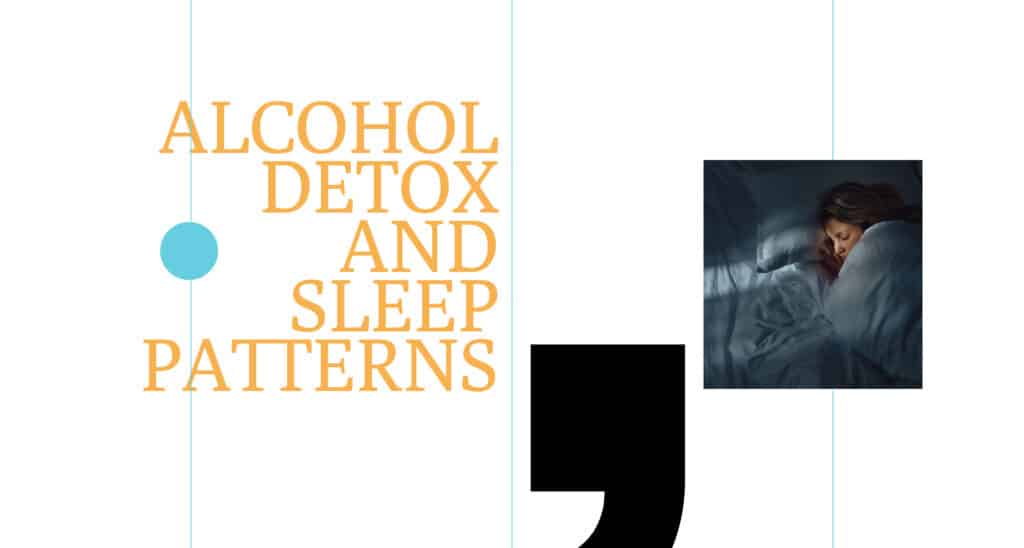Alcohol detoxification is a crucial step toward recovery from addiction, but it often brings about a variety of challenges, including significant disruptions to sleep patterns. These disturbances can be more pronounced in alcohol-dependent patients, who may experience physical dependence and severe withdrawal symptoms. Symptoms of alcohol withdrawal, such as anxiety, nausea, and poor sleep, are common during this period.
Understanding the impact of alcohol detox on sleep and implementing strategies to manage these disturbances can play a vital role in a successful recovery process. This blog post explores the intricate relationship between alcohol detox and sleep patterns, providing actionable tips for achieving restful sleep during this critical phase.
The Impact of Alcohol on Sleep
Alcohol consumption can significantly disrupt sleep patterns. Initially, alcohol acts as a sedative, making it easier to fall asleep. However, as it is metabolized, it interferes with the sleep cycle, particularly the REM (rapid eye movement) phase, which is crucial for restorative sleep. This disruption can lead to fragmented sleep and poor sleep quality. Heavy drinkers often experience chronic sleep disruptions, making it difficult to achieve adequate sleep. The decrease in REM sleep and REM sleep bout rate further exacerbate sleep issues in people with alcohol use problems.
Sleep Disturbances During Alcohol Detox
During alcohol detox, individuals often experience a range of sleep disturbances due to the withdrawal symptoms and the body’s readjustment process. Common issues include:
- Insomnia: Difficulty falling or staying asleep is prevalent during detox, often referred to as alcohol withdrawal insomnia.
- Nightmares and vivid dreams: These can be more frequent and intense during detox, impacting the REM sleep onset latency.
- Daytime sleepiness: Despite sleeping, individuals may feel tired and unrefreshed upon waking, affecting their daytime alertness.
These symptoms are often coupled with physical symptoms such as a rapid heart rate, which can further complicate sleep patterns. Acute alcohol withdrawal can also cause disturbed sleep and sleep abnormalities, making it challenging to maintain a regular sleep schedule. Additionally, substance use disorder can exacerbate mental disorders, complicating the detoxification program.
Managing Sleep During Alcohol Detox
Improving sleep during alcohol detox requires a combination of lifestyle changes and possibly medical interventions. Here are some strategies:
Establish a Consistent Sleep Schedule
Keeping a regular sleep schedule helps your body’s internal clock, or circadian rhythm, stay on track. Try to go to bed and wake up simultaneously every day, including weekends. This consistency can help improve sleep efficiency and deep sleep. Maintaining a consistent sleep time is particularly important for sleep in alcoholics.
Create a Calming Bedtime Routine
Developing a pre-sleep routine can signal your body that it’s time to wind down. This might include activities like:
- Taking a warm shower
- Reading a book
- Practicing gentle yoga or stretching
- Listening to soothing music or nature sounds
Such routines can help ease the negative affect associated with withdrawal from alcohol and promote better sleep quality. Sleep experts often recommend these practices to reduce Composite sleep fragmentation.
Optimize Your Sleep Environment
Keep your bedroom dark, calm, and quiet to ensure a comfortable sleep environment. Investing in a comfortable mattress and pillows can also make a significant difference. If light and noise are issues, consider using blackout curtains and earplugs. Additionally, managing the room’s temperature and humidity can enhance the subjective sleep experience. Sleep-disturbed patients may benefit from these adjustments to their sleep variables.
Avoid Stimulants
Limit caffeine and nicotine intake, especially before bedtime. These substances can increase alertness and make it difficult to fall asleep. Avoiding stimulants can reduce sleep latency and help in achieving healthier lifestyle choices. Obstructive sleep apnea and other disordered sleep conditions can worsen with stimulant use, increasing the risk factor for subsequent relapse.
Stay Active
Regular physical activity can improve sleep quality, though avoiding exercise close to bedtime is best. Activities like walking, swimming, or yoga can be beneficial. Exercise can help mitigate the effects of alcohol withdrawal and improve cognitive function and executive performance. It can also counteract the mechanisms of alcohol that impair mental health.
Natural Remedies and Supplements
Specific natural remedies and supplements may help improve sleep during alcohol detox:
- Herbal Teas: Chamomile, valerian root, and passionflower teas have calming effects that can promote comfortable sleep.
- Magnesium: Taking magnesium supplements, particularly magnesium citrate, can help with relaxation and sleep. A recommended dose is around 100 mg taken an hour before bed.
- Amino Acids: Supplements like 5-HTP, L-theanine, and N-acetyl cysteine (NAC) support neurotransmitter function and can help alleviate anxiety and improve sleep.
Seeking Professional Help
Professional medical intervention may be necessary to manage severe sleep disturbances during alcohol detox. This can include the use of medications prescribed by a healthcare provider to alleviate withdrawal symptoms and promote sleep. Sedating antidepressants and other pharmacological treatments may be considered under professional guidance, especially for those with co-occurring mental health conditions.
The Role of Behavioral Therapies
Behavioral therapies are an integral part of recovery and can also aid in managing sleep issues. Cognitive-behavioral therapy (CBT), for instance, helps individuals develop healthy sleep habits and addresses anxiety or depression that may interfere with sleep. Cognitive performance can also be improved through these therapies, which can be particularly beneficial for patients in recovery. Co-occurring disorders, such as depression factors, may require specialized therapeutic approaches.
Conclusion
Alcohol detox and sleep patterns are intricately linked, with detox often leading to significant sleep disturbances. However, by understanding these challenges and implementing strategies to manage them, individuals can improve their sleep quality, which is essential for overall recovery.
To improve sleep during alcohol detox, you can set a regular sleep schedule, make your sleep space more comfortable, use natural remedies, and get professional help. Mild-AWS and moderate-AWS patients may experience varying degrees of disturbance among patients, and tailored approaches can make a difference. The Mental Health Services Administration provides resources and support for managing alcohol use disorder and related mental health treatments.
For more detailed guidance and support during alcohol detox, consider reaching out to healthcare professionals or specialized detox centers that offer comprehensive care tailored to individual needs. Recovery Village, for example, offers resources and support for those undergoing detox and aiming for continued abstinence.









